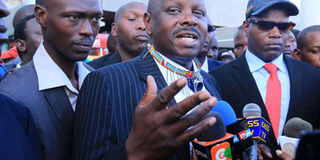Jubilee plans to rig presidential poll, claims Governor Ruto

Governor Isaac Ruto. He has alleged that Jubilee is plotting to use the manual voting system to manipulate August polls in favour of President Uhuru Kenyatta. PHOTO | JEFF ANGOTE | NATION MEDIA GROUP
What you need to know:
- Bomet Governor Isaac Ruto said the manual voting system could pave way for use of names of the dead in the August elections.
- Jubilee is rooting for a manual voting system as a backup should the electronic one fail.
Bomet Governor Isaac Ruto has said Jubilee is plotting to use the manual voting system to manipulate the election in favour of President Uhuru Kenyatta.
The county boss on Sunday called on Kenyans to be vigilant and demand credible elections.
Addressing a Chama Cha Mashinani rally at Sosiot grounds in Belgut Constituency, Kericho County after opening party offices, Mr Ruto said the manual voting system could pave way for use of names of the dead in the August elections.
“How do we explain a situation where some people turn up to vote for the presidential candidate only? These are dead people whose names have been sneaked into the register. We are fed up with vote theft,” said the governor.
Jubilee is rooting for a manual voting system as a backup should the electronic one fail.
Last week, Mr Kenyatta signed the Elections Amendment Bill into law, effectively making the use of manual voting legal.
WIN FAIRLY
In a quick response, Jubilee politician Raymond Cheruiyot dismissed the governor’s claims as fictitious, adding that Jubilee would win fairly.
Mr Cheruiyot accused Mr Ruto of being used by the Cord to split the Kalenjin.
“Jubilee will have no reason to steal votes, owing to its development record. Governor Ruto should stop misleading Kenyans,” said Mr Cheruiyot.
Mr Ruto said the reasons given for a possibility of the electronic system failing were trivial.
“Jubilee should have considered the development of a special electronic card to be used during the election,” he said, adding that the card should have names of the voters and other details.
He questioned the thinking that the electronic voter identification devices might not recognise some voters on election day — especially manual labourers and tea pickers — because of changes that may have occurred to their fingerprints.





